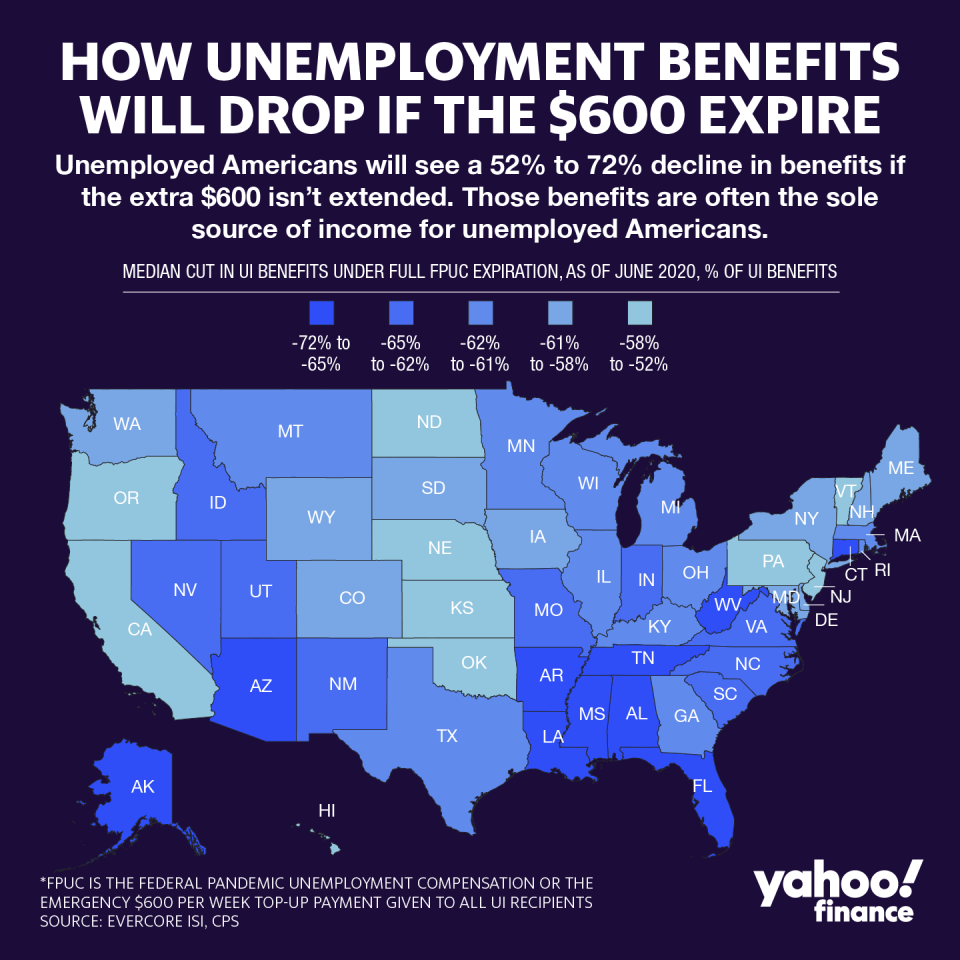Coronavirus stimulus: McConnell says any Trump-Democrats deal works for him amid GOP disarray
Senate Majority Leader Mitch McConnell (R-KY) said that he will support a stimulus deal agreed upon by the Trump administration and the Democrats as Republicans struggle to unify amid the second week of ongoing negotiations over the next coronavirus stimulus bill.
"Wherever this thing settles between the president of the United States and his team that have to sign it into law, and the Democrats — not insignificant minority in the Senate and the majority in the House — is something I'm prepared to support, even if I have some problems with certain parts of it," McConnell told reporters when asked about potentially supporting an extension of the extra $600 in weekly unemployment benefits provided by the CARES Act through July.
It’s unclear if how invested the White House is in negotiations with Democrats — White House Chief of Staff Mark Meadows and Treasury Secretary Steve Mnuchin are involved in talks — or if the president will instead attempt unilateral action. The Washington Post reported that the White House is considering executive orders involving renewing the federal eviction moratorium, suspending the collection of payroll taxes, and using unused funding for extra unemployment benefits.

“A lot of people are going to be evicted, but I’m going to stop it because I’ll do it myself if I have to,” President Donald Trump said at an event at the White House on Monday. “I have a lot of powers with respect to executive orders, and we’re looking at that very seriously right now.”
It's also unclear how far executive orders can go. Earlier on Tuesday, White House Economic Advisor Larry Kudlow stated: "We have got to fix and extend the unemployment issue right now... I don't think that can be done administratively. I think that requires an act of Congress.”
In any case, McConnell conceded that Republicans cannot seem to agree on a negotiating position.
“If you’re looking for total consensus among Republican senators, you’re not gonna find it,” McConnell said when asked on what the future of the extra unemployment benefits should be. “We do have divisions, about what to do.”
‘If the unemployment goes down, then that number can go down’
Around 30 million Americans are seeing a lapse in their extra unemployment benefits because Congress was unable to pass a deal before the $600 under the CARES expired on July 31.
The Democrats introduced the HEROES Act, which passed the House in May but was never taken up by the Senate, as their plan for the next coronavirus stimulus bill. Multiple Republican proposals have been floating around since last week.

The first GOP plan, released last week, suggested cutting the extra unemployment benefits to $200 and then transitioning to a 70% wage replacement rate. The second one, introduced by Sen. Mitt Romney (R-UT) and other GOP senators, allows states to choose between an 80% wage replacement rate or gradually reducing the extra benefits every month.
Sen. Lindsey Graham (R-SC) announced a third proposal on the future of the additional extended unemployment benefits that would replace 100% of the worker’s prior wage.
“I want to replace your wages but not give you a pay raise,” Graham told reporters on Monday. “A 100% I’m willing to do that because this is a national emergency, but if you go above 100%, you’re really disincentivizing workers.”

Experts have previously noted that any wage replacement approach would be hard to implement due to the complexity of how different states calculate unemployment benefits. Specifically, states would need from 8 to 20 weeks, according to an estimate by the National Association of State Workforce Agencies (NASWA) provided to Yahoo Money by The Committee on Ways and Means.
“Ordinarily if we were to ask states to do something like that, outside of a pandemic, we would give them two years to conform,” Michele Evermore, senior policy analyst at the National Employment Law Project, said about the wage replacement approach. "That's how it usually works.”
When asked whether she’s open to negotiating a lower amount than the weekly $600 in extra unemployment benefits, Speaker Nancy Pelosi (D-CA) said that Democrats want to maintain the benefits at that rate while the jobless rate remains high.
"I think that the number, the $600, is related more to the unemployment rate,” Pelosi told CNN on Monday. “If the unemployment goes down, then that number can go down."
Denitsa is a writer for Yahoo Finance and Cashay, a new personal finance website. Follow her on Twitter @denitsa_tsekova.
Read more:
Rich Americans' pullback in spending is hurting the economic recovery
Even as GDP tanked, personal income grew thanks to government support
Read more personal finance information, news, and tips on Cashay
Follow Yahoo Finance on Twitter, Facebook, Instagram, Flipboard, SmartNews, LinkedIn, YouTube, and Reddit.

 money
money 
